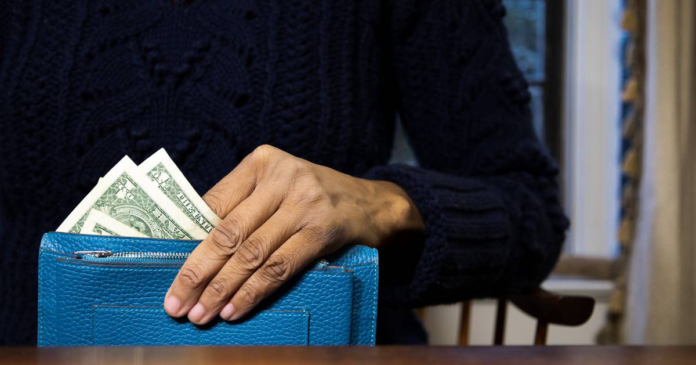Currently, 41% of Americans report that “none of their purchases in a typical week are paid for using cash,” Pew reported last week. (Catherine McQueen/Getty Images)
“Cash is king,” or so they say.
These days, that’s not saying much. These days, cash is not king, nor queen, nor princess. It’s not even the court jester.
Advertisement
The nation is going cashless. We are swiftly moving toward the universal use of digital currency — credit and debit cards, online purchasing, tap and go — for everything we buy, spend and do.
I don’t like it. I belong to a dwindling class of those who covet their cold, hard cash.
Advertisement
The portion of Americans who go “cashless” in a typical week has increased significantly since 2015, according to a newly released survey by the Pew Research Center, taken in July of U.S. adults.
Currently, 41% of Americans report that “none of their purchases in a typical week are paid for using cash,” Pew reported last week.
That’s up from 2018, when 29% said they did not use cash for typical purchases; only 24% said so in 2015.
“Conversely, the portion of Americans who say that all or almost all of their purchases are paid for using cash in a typical week has steadily decreased, from 24% in 2015 to 18% in 2018 to 14% today,” Pew reported.
Still, 59% of those surveyed “say that in a typical week, at least some of their purchases are paid for using cash.”
My mother’s age-old advice still rings in my ears. Don’t ever go out of the house — or anywhere — without some bucks. Always have a little in your pocket, or in your shoe. You never know when you will end up in a jam, and need the cash.
The cashless society is barreling down on me.
A few years ago, I noticed that hipster restaurants and coffee shops were going cashless. I would pull out my green, and get an eye roll from the 20-something, orange-haired clerk at the register. “No cash. Can’t you see the sign?”
Advertisement
The pandemic has accelerated the trend, thanks to unfounded fears that (literally) dirty money would spread the COVID-19 menace. The social and economic turmoil of these times has led to cash shortages at banks and other financial institutions.
Now, everywhere I go, my fulsome wallet is met with sneers and jeers.
The Chicago Bears kicked off the season by going cashless at Soldier Field. Bears fans must use credit, debit or prepaid cards, or mobile payments for all purchases.
Every other major Chicago sports stadium, such as the United Center, Wrigley Field, and Guaranteed Rate Field were already cashless.
Want a beer or two? Just hand your card to a vendor.
“No cash in the register.” That’s what the sleepy clerk at Dunkin’ Donuts where I make a regular 5 a.m. coffee run has been saying, with alarming regularity.
Advertisement
I can’t deal with this. I haven’t even had my coffee yet.
I’m no Neanderthal. I understand why the world is going cashless. It’s a policy that curbs fraud, reduces physical contact and enhances efficiency.
But I am digging in my determined heels. You are not going to take my dead presidents.
My green is the real thing, not bits and bytes on a screen. I love the smell of the green stuff, its aroma of security and prosperity.
Money, and our physical connection to it, is as old as civilization. Before dollars, dinero, shekels and wampum, the currency was cocoa, cowrie shells and cows. Over the centuries, whatever form it took, you could touch and hold it. (On a trip to Senegal years ago, an African trader tried to barter with my mother by offering a cow in exchange for me).
Most of my routine daily purchases register under $20. Pulling out plastic every time I pick up my favorite sugarless gum or nonfat latte is becoming a major pain.
Advertisement
If you go cashless, you are captive to plastic.
I live in fear of getting a “negative balance” on my CTA Ventra card — and not having the two bucks and change for my ride.
I pity those who get their credit card bills and bank statements, loaded with pages and pages of debits. Who has the time or eyeballs to review dozens of charges?
Fraud is on the rise, and the more we depend on the plastic, the more likely we will fall to the fraudsters. Yes, the experts say you should check your credit card and bank records regularly. How many of us do it?
And what about those who don’t have the luxury of easy money? Like low-income families with limited access to digital banking and commerce.
Americans with lower incomes “continue to be more reliant on cash than those who are more affluent,” the Pew study reports. “Three-in-ten Americans whose household income falls below $30,000 a year say they use cash for all or almost all of their purchases in a typical week. That share drops to 20% among those in households earning $30,000 to $49,999 and 6% among those living in households earning $50,000 or more a year.”
Advertisement
Cash may no longer be king, but it will always be royalty to me.
Laura Washington is a political commentator and longtime Chicago journalist. Her columns appear in the Tribune each Monday. Write to her at LauraLauraWashington@gmail.com.
Submit a letter, of no more than 400 words, to the editor here or email letters@chicagotribune.com.



